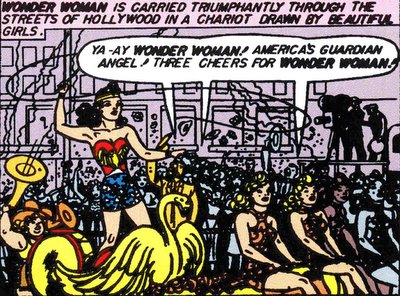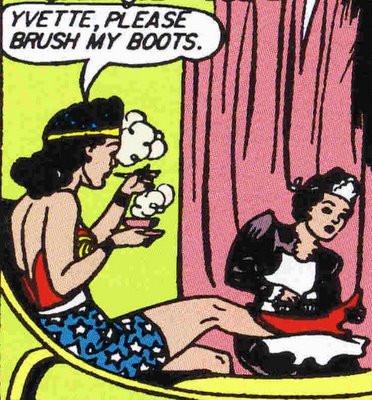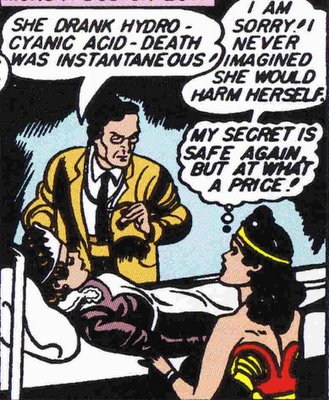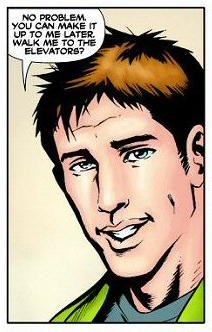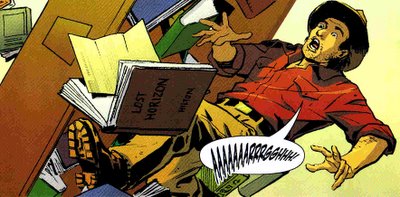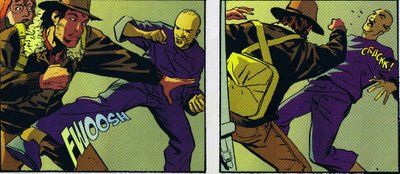DiDio said “What you call dark, we call drama. Some people expect Superman to stop robberies at a corner store. He needs threats of a greater nature.”This is from the transcript of the "52 Pick-up Panel" at the recent New York City comic convention. On the one hand, I understand what Dan Didio means, and I agree that Superman needs some threats of a greater nature.. On the other hand...
Well, I'm one of those people who expects Superman to stop robberies at a corner store.
 Watching Superman grapple with a (supposed) angel or pulls the moon back into orbit makes for an artistically dramatic panel. But it has so little relation to every day experience as to render it nearly meaningless to me as a reader. As others have commented, it's seeing Superman pick up a car or a tank that wows you, because you have a real sense of how much power that takes.
Watching Superman grapple with a (supposed) angel or pulls the moon back into orbit makes for an artistically dramatic panel. But it has so little relation to every day experience as to render it nearly meaningless to me as a reader. As others have commented, it's seeing Superman pick up a car or a tank that wows you, because you have a real sense of how much power that takes.It's all well and good to pretend that you're going to keep Superman at a "reasonable reduced power level". Uh-huh. But every time that's done, fans complain that he's not powerful enough, or writers have to top themselves with increasingly powerful threats, and before you know it Superman's pushing planets again.
That's why I deplore the "arms race" that always leads to Superman fighting bigger and bigger monsters. Sure, a good old donnybrook with Solomon Grundy is always fun. But the only way to continously and engagingly write Superman is to put him in situations that his raw power won't solve.
For all their story-telling faults, Golden and Silver Age writers understood this in a way current writers (other than Greg Rucka) do not seem to. The Prankster; The Toyman; Wilbur Wolfingham; Mr. Mxyzptlk; Lex Luthor: these characters present intellectual challenges that can't simply be punched out of. Such figures have been squeezed out in favor of monsters-of-the-month like Mongul and Doomsday, and super-story-telling has been the poorer for it, I think.
Superman's abilities should help him solve problems but they shouldn't solve problems for him. Sometimes it's a subtle difference, but it's a huge difference nonetheless. We can laugh at the repetitive Silver Age plots of "must conceal secret identity", "must teach so and so a lesson", "must protect such and such without it being obvious", but those writers knew that mere physical challenges weren't the way to go. They forced Superman to use his power intelligently, efficiently, subtly; when you have as much power as Superman, that is a challenge.
Yes, I would like to see Superman stop corner store robberies, because, in many ways, that's a bigger challenge to him than monster-bashing. Imagine today that you have Superman's powers. How do you use them to stop crime and keep people safe? Today. In your city.
Tough, isn't it? If a big monster lands in your town and starts tearing up the street, well, then you know what to do; that's easy to figure (for you and the writers). But absent that, how do you apply your powers to fighting ordinary crime and corruption? WHILE holding down a full-time, fairly high-profile job? WITHOUT revealing who are, which would ruin your life and endanger everyone you care about? That is job for Superman, because anybody can deal with monsters.
Moral challenges are also part of the job, as the return of the Golden Age Superman has highlighted. How much do you use your powers to change things? Do you knock down slums? Slumlords? Intimidate the governor? Grab the leaders of foreign nations and strand them on a mountaintop? How activist should a Superman be? Does he work mostly to reinforce and protect society and "the system" or to reform them?
I'll bet every single reader of this blog could come up with a "Superman saves the corner store" story. I happen to think there are a lot of Superman stories to tell that don't require angelic wrestling matches. Does DC?
Do you?




